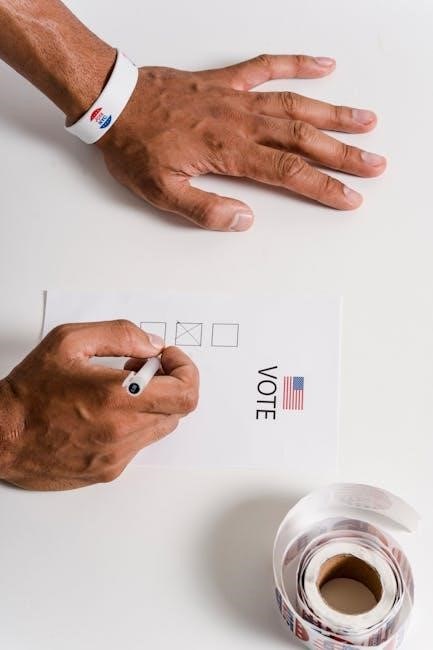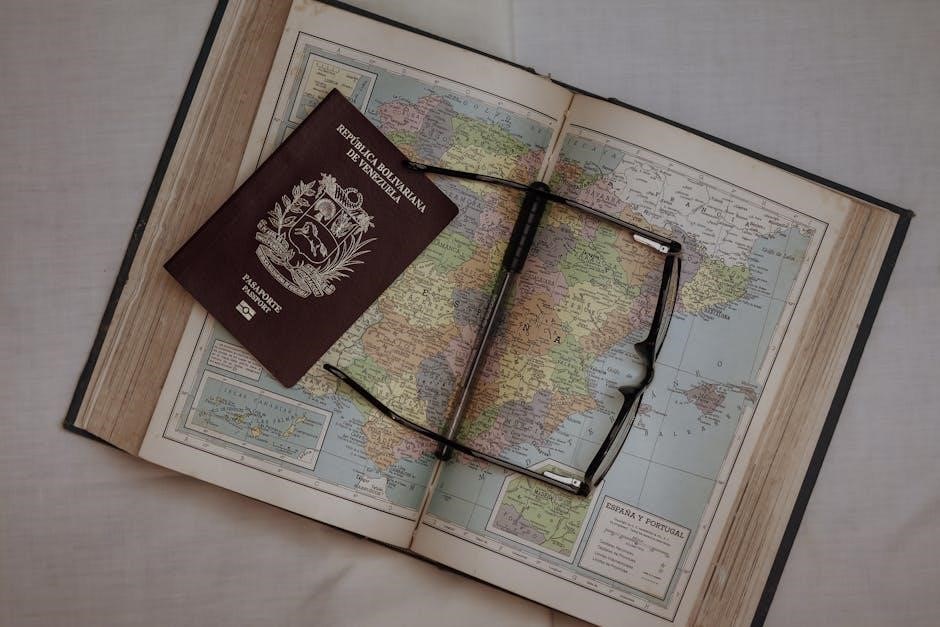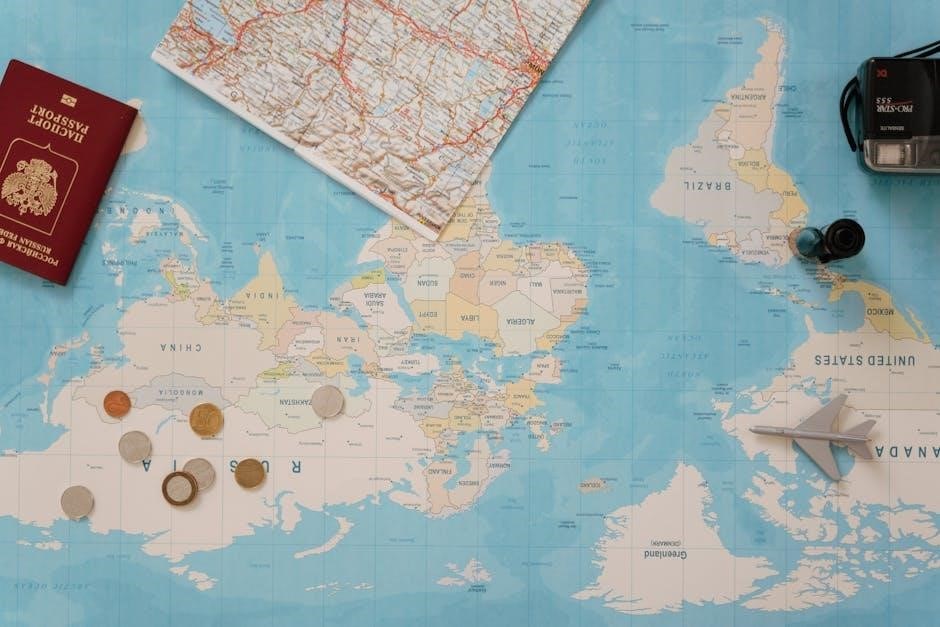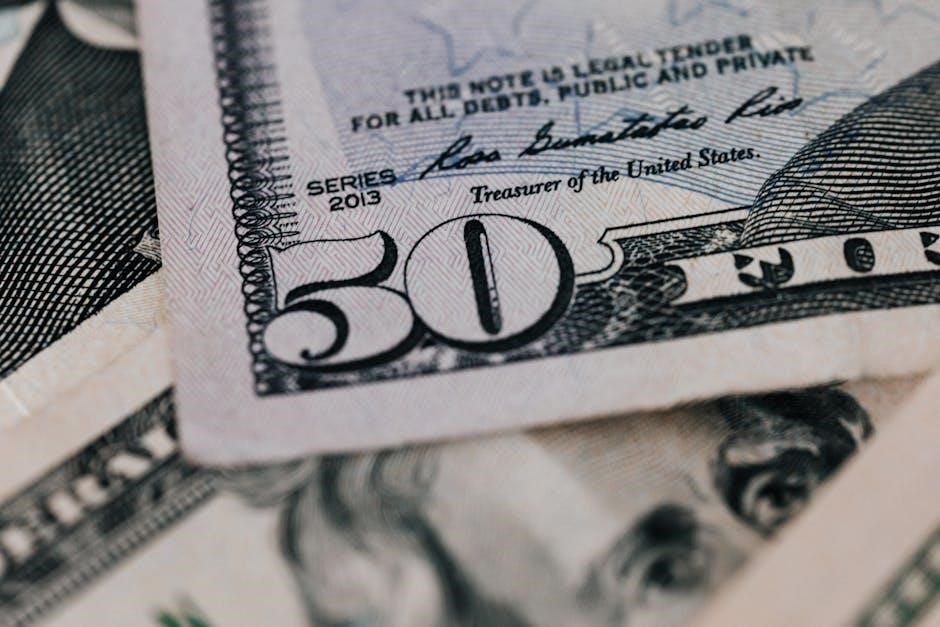The phrase “America is Morocco on Paper PDF” symbolizes the historical and cultural connections between the two nations, reflecting mutual respect and shared diplomatic values since 1786․
Understanding the Title and Its Implications
The title “America is Morocco on Paper PDF” hints at a symbolic comparison between the two nations, emphasizing historical ties and cultural exchange․ It reflects how both countries, despite geographical and cultural differences, share foundational values of freedom and mutual respect․ The phrase underscores the significance of their 1786 treaty, which laid the groundwork for a lasting diplomatic relationship․ This analogy highlights the depth of their connection, transcending borders and time, symbolizing a bond rooted in trust and collaboration․
Historical Context of U․S․-Morocco Relations
The historical context of U․S․-Morocco relations is rooted in mutual respect and early diplomatic engagement․ Morocco was among the first nations to recognize American independence in 1776, paving the way for formal ties․ The 1786 Treaty of Peace and Friendship solidified this relationship, marking one of America’s earliest international agreements․ This foundational bond has endured, reflecting shared values and a commitment to cooperation that continues to shape their alliance today․
Overview of the Moroccan-American Treaty of 1786
The Moroccan-American Treaty of 1786, signed on December 23, is one of the oldest U․S․ treaties still in force․ It established peace, friendship, and mutual navigation rights between the two nations․ The treaty also guaranteed protection for American ships in Moroccan ports and laid the groundwork for future diplomatic and trade relations․ This agreement marked a significant milestone in U․S․ foreign policy, showcasing early American efforts to build international alliances and secure economic opportunities․

Historical Aspects of the U․S․-Morocco Relationship
The U․S․-Morocco relationship traces back to the 18th century, rooted in mutual respect and strategic interests, evolving into a model of enduring cooperation and cultural exchange․
The Moroccan-American Treaty of Peace and Friendship
The Moroccan-American Treaty of 1786, also known as the Treaty of Peace and Friendship, marked the beginning of formal diplomatic relations between the two nations․ Signed in Marrakech, it was the first bilateral treaty entered into by the United States following its independence․ The treaty established mutual recognition of sovereignty, trade agreements, and protections for American ships in Moroccan ports․ It reflects Morocco’s early support for American independence and laid the foundation for a lasting alliance based on mutual respect and cooperation․
Early Diplomatic Interactions Between the Two Nations
The earliest diplomatic interactions between the U․S․ and Morocco began in the late 18th century, driven by mutual economic and strategic interests․ Morocco, under Sultan Mohammed III, was one of the first nations to recognize American independence․ Initial contacts involved negotiations over trade rights and maritime security in the Mediterranean․ These early exchanges laid the groundwork for formal relations, showcasing Morocco’s openness to collaboration with the young American republic and its leaders, such as John Adams and Thomas Jefferson․
Morocco’s Perception of the Early American Republic
Morocco viewed the early American Republic with curiosity and strategic interest․ Recognizing the U․S․ as a nation rebelling against colonial rule, Morocco saw parallels to its own resistance against European encroachment․ The Sultanate admired American ideals of liberty and self-determination, perceiving the new nation as a potential ally in balancing Mediterranean power dynamics․ This perception fostered mutual respect and laid the groundwork for a cooperative relationship based on shared values and pragmatic interests․

Cultural and Social Comparisons
Morocco’s rich Arab-Berber heritage contrasts with America’s diverse melting pot, yet both societies value hospitality and community, fostering vibrant cultural exchange and mutual appreciation․
Cultural Exchange Programs Between the U․S․ and Morocco
Cultural exchange programs between the U․S․ and Morocco have strengthened ties, fostering mutual understanding through educational initiatives, art exhibitions, and linguistic exchanges․ The Fulbright Program and other scholarships enable Moroccan students to study in America, while American students immerse themselves in Morocco’s rich cultural heritage․ These exchanges promote cross-cultural dialogue, enhancing collaboration in education, arts, and innovation․ They also highlight shared values, such as hospitality and community, bridging the gap between the two nations’ diverse traditions and fostering lasting connections․
Mutual Influences in Art, Music, and Film
The cultural exchange between the U․S․ and Morocco is evident in art, music, and film․ Moroccan Gnawa music has influenced American jazz, while American artists like Brian Eno have incorporated Moroccan rhythms․ In film, Morocco’s landscapes have been featured in Hollywood blockbusters, blending cinematic storytelling with cultural richness․ Similarly, Moroccan filmmakers draw inspiration from American narrative styles, creating a dynamic cross-cultural dialogue․ These mutual influences highlight the deep-rooted connection and shared creative spirit between the two nations, enriching global culture․
Educational Initiatives and Student Exchanges
Educational exchanges between the U․S․ and Morocco have fostered cultural understanding and academic collaboration․ Programs like the Fulbright Scholarship and the International Student Exchange Program enable students to study abroad, promoting cross-cultural learning․ Moroccan universities increasingly adopt American educational models, while U․S․ institutions incorporate Arabic language and North African studies․ These initiatives strengthen people-to-people ties, preparing future leaders to navigate global challenges with a deeper appreciation of each other’s cultures and perspectives․

Political and Economic Relations
The U․S․ and Morocco maintain a robust strategic partnership, strengthening regional stability and fostering economic growth through mutual trade agreements and diplomatic collaboration․
Modern-Day Political Partnerships
The U․S․ and Morocco share robust political ties, with a focus on counterterrorism, regional stability, and mutual economic development․ Both nations collaborate on initiatives like the Middle East Peace Initiative and joint military exercises, fostering trust and cooperation․ These partnerships highlight a shared commitment to global security and sustainable development, ensuring a strong foundation for future collaboration․
Economic Collaborations and Trade Agreements
The U․S․ and Morocco have established strong economic ties through trade agreements, fostering mutual growth․ The 2004 U․S․-Morocco Free Trade Agreement eliminated tariffs on most goods, boosting trade in sectors like agriculture, automotive, and renewable energy․ These collaborations enhance economic opportunities, create jobs, and strengthen bilateral partnerships, reflecting a shared commitment to prosperity and development․
Shared Interests in Global Security and Stability
The U․S․ and Morocco share strategic interests in maintaining global security and stability․ Both nations collaborate on counterterrorism efforts, particularly in the Sahel region, to combat extremist groups․ Morocco’s geographic proximity to Europe and Africa makes it a crucial partner for the U․S․ in addressing regional threats․ Their cooperation extends to multilateral frameworks, enhancing peacekeeping and crisis management․ This partnership underscores a mutual commitment to safeguarding international security and promoting stability worldwide․

Legal and Diplomatic Frameworks
The U․S․-Morocco relationship is rooted in the 1786 Treaty of Friendship, establishing a legal and diplomatic foundation that facilitates cooperation in trade, security, and cultural exchanges․
The Significance of the 1786 Treaty in Modern Diplomacy
The 1786 Treaty of Friendship between the U․S․ and Morocco remains a cornerstone of modern diplomacy, symbolizing mutual respect and cooperation․ As one of the oldest U․S․ treaties still in force, it underscores Morocco’s early embrace of international relations and its strategic importance in North Africa․ The treaty’s principles of peace, friendship, and mutual respect continue to shape contemporary diplomatic engagement, highlighting the enduring relevance of historical agreements in fostering stability and collaboration․
Legal Implications of Historical Agreements
Historical agreements, such as the 1786 Treaty, establish legal frameworks that influence modern diplomacy․ These treaties set precedents for international law, shaping concepts like sovereignty, trade, and jurisdiction․ The enduring nature of such agreements underscores their relevance in resolving contemporary disputes and fostering cooperation․ They also highlight the importance of honoring commitments, ensuring stability in international relations and serving as a foundation for future legal and diplomatic collaborations between nations like the U․S․ and Morocco․
Contemporary Diplomatic Missions and Objectives
Contemporary diplomatic missions between the U․S․ and Morocco focus on strengthening bilateral ties through mutual objectives․ These include enhancing economic partnerships, advancing regional security, and fostering cultural exchange․ Both nations prioritize collaboration on global challenges, such as climate change and counterterrorism․ Diplomatic efforts also aim to promote mutual understanding and cooperation in education, technology, and trade․ These missions underscore the shared commitment to stability, prosperity, and long-term partnership between the two nations․

Perceptions and Stereotypes
Americans often view Morocco as a land of rich culture and history, while Moroccans see the U․S․ as a symbol of innovation and diversity․ Stereotypes persist, but mutual curiosity fosters understanding․
How Americans View Morocco
Americans often perceive Morocco as a land of rich history, vibrant culture, and stunning landscapes․ The country’s unique blend of Arab, Berber, and Mediterranean influences fascinates many․ Morocco’s historic cities, such as Marrakech and Fes, are seen as exotic destinations․ Americans also recognize Morocco’s strategic role in North Africa and its efforts in global issues like climate change․ However, some may have limited awareness of Morocco’s modern advancements and its diverse contributions beyond tourism and cultural heritage․
How Moroccans View America
Moroccans often view America as a symbol of innovation, freedom, and global influence․ The U․S․ is admired for its technological advancements and cultural exports, such as Hollywood films and music․ Many Moroccans see America as a land of opportunity, particularly in education and entrepreneurship․ However, some may hold nuanced views due to geopolitical dynamics and cultural differences․ Morocco’s historical alliance with the U․S․ fosters a sense of mutual respect and cooperation, blending admiration with a critical perspective on foreign policies․
Addressing Misconceptions and Stereotypes
Misconceptions about each other persist in U․S․-Moroccan relations․ Some Americans may view Morocco through an Orientalist lens, oversimplifying its culture and history․ Conversely, Moroccans might perceive America as overly materialistic or dismissive of traditional values․ Open dialogue, cultural exchanges, and education are key to dispelling stereotypes․ By fostering mutual understanding, both nations can move beyond simplistic narratives and build a more nuanced appreciation for their shared humanity and diverse experiences․
Modern Collaborations and Initiatives
The U․S․ and Morocco collaborate on renewable energy projects, digital innovation, and cultural preservation․ These efforts foster innovation, mutual understanding, and sustainable development․
Joint Efforts in Technology and Innovation
The U․S․ and Morocco are advancing joint initiatives in renewable energy, digital innovation, and research partnerships․ Collaborations in STEM fields foster innovation and economic growth․ Both nations invest in startups and tech hubs, promoting entrepreneurship․ These efforts enhance global competitiveness and address climate change․ The partnership strengthens mutual capabilities, driving progress in sustainable technologies and digital infrastructure, benefiting both nations and the global community․
Environmental and Sustainability Initiatives
The U․S․ and Morocco collaborate on environmental sustainability, focusing on renewable energy and climate action․ Morocco’s solar initiatives, like the Noor Solar Plant, align with U․S․ goals for clean energy․ Both nations promote sustainable agriculture and water management․ Joint efforts address plastic pollution and marine conservation․ These initiatives reflect a shared commitment to combating climate change and fostering eco-friendly development, enhancing their partnership in environmental stewardship and global sustainability efforts․
Cultural Preservation and Heritage Projects
Both nations emphasize cultural preservation through collaborative projects, protecting historical sites and promoting traditional arts․ The U․S․ and Morocco jointly support UNESCO World Heritage initiatives, restoring ancient monuments like Volubilis and Marrakech’s medinas․ Cultural exchange programs highlight shared heritage, fostering mutual understanding․ These efforts preserve Morocco’s rich history while showcasing its cultural significance to the world, strengthening the U․S․-Morocco cultural bond and promoting cross-cultural appreciation and collaboration․

Security and Defense Cooperation
The U․S․ and Morocco maintain a strong strategic partnership, collaborating on counterterrorism efforts, joint military exercises, and regional security initiatives to ensure stability in North Africa․
Counterterrorism Efforts and Intelligence Sharing
Both nations collaborate closely in counterterrorism, sharing intelligence to combat threats in North Africa and beyond․ Morocco’s strategic location and U․S․ expertise create a robust partnership․ Joint initiatives, such as Operation Enduring Freedom, highlight their commitment to regional stability․ Intelligence-sharing programs have disrupted terrorist networks, fostering a safer environment․ Morocco’s efforts in the Sahara and Sahel regions complement U․S․ counterterrorism goals, ensuring a united front against extremism and enhancing global security efforts together․
Military Training and Joint Exercises
Morocco and the U․S․ engage in extensive military training and joint exercises, strengthening defense ties․ Annual drills like African Lion enhance interoperability, focusing on desert warfare, amphibious operations, and counterterrorism strategies․ These exercises foster mutual understanding and readiness, addressing shared security challenges․ Morocco’s hosting of such events underscores its role as a key regional partner, while the U․S․ gains valuable insights into North African military dynamics, bolstering bilateral and regional stability efforts effectively․
Regional Security Initiatives

The U․S․ and Morocco collaborate on regional security initiatives to combat terrorism and instability․ Programs like the Trans-Sahara Counterterrorism Partnership strengthen regional capacities․ Morocco’s strategic location allows it to bridge Europe, Africa, and the Middle East, making it a vital partner in maritime security and counterpiracy efforts․ Joint initiatives also focus on intelligence sharing and border security, ensuring a safer and more stable region․ These efforts highlight Morocco’s role as a key ally in addressing global security challenges effectively․

Challenges and Controversies
The U․S․-Morocco relationship faces challenges, including historical conflicts, debates over human rights, and economic disparities․ These issues occasionally strain relations, requiring diplomatic efforts to resolve tensions and strengthen cooperation for mutual benefit․
Historical Conflicts and Their Impact
Historical tensions, such as early trade disputes and territorial disagreements, have shaped the complex dynamics between the U․S․ and Morocco․ These conflicts, rooted in colonial and post-colonial eras, influenced diplomatic relations and economic interactions․ Despite these challenges, both nations have sought reconciliation through treaties and mutual agreements, fostering a path toward cooperation and understanding․ The impact of these historical events continues to be felt, emphasizing the importance of addressing past grievances to strengthen modern alliances․
Current Debates on Human Rights and Governance
Current debates on human rights and governance highlight tensions between Morocco and the U․S․, particularly regarding freedom of expression and political reforms․ While Morocco emphasizes stability and development, critics argue for greater transparency and accountability․ The U․S․ occasionally raises concerns about human rights violations, yet acknowledges Morocco’s strategic importance; These discussions underscore the complexities of balancing democratic values with geopolitical interests, shaping the evolving nature of their alliance․
Economic Disparities and Development Challenges
Economic disparities between the U․S․ and Morocco reflect differing stages of development․ Morocco’s economy, reliant on agriculture, tourism, and phosphate exports, faces vulnerabilities like climate variability and global market fluctuations․ The U․S․ supports Morocco’s development through investments in infrastructure and trade agreements․ However, income inequality and unemployment persist, particularly in rural areas․ Balancing economic growth with social equity remains a challenge, impacting Morocco’s ability to achieve sustainable development and reduce poverty, despite progress in sectors like renewable energy and industrial expansion․

Future Prospects and Opportunities
The U․S․ and Morocco can expand trade, foster technological innovation, and enhance educational partnerships, addressing global challenges together for sustainable development and mutual future prosperity․
Expanding Economic and Cultural Ties
The U․S․ and Morocco can deepen economic partnerships through increased trade and investment, particularly in renewable energy and technology sectors․ Cultural exchanges, such as art exhibitions, film festivals, and educational programs, will strengthen people-to-people connections․ Tourism initiatives can also flourish, showcasing Morocco’s rich heritage to American visitors․ These efforts will foster mutual understanding and pave the way for long-term collaboration, benefiting both nations economically and culturally․
Addressing Global Challenges Together
The U․S․ and Morocco can collaborate on pressing global issues like climate change, food security, and public health․ By sharing expertise in renewable energy and sustainable agriculture, both nations can drive innovation․ Joint efforts in pandemic preparedness and global health security will strengthen international responses․ Such collaborations not only address shared challenges but also foster trust and cooperation, aligning with their mutual commitment to a stable and prosperous world․
Vision for a Stronger U․S․-Morocco Alliance
A shared vision for a stronger U․S․-Morocco alliance emphasizes mutual respect, trust, and collaboration․ By leveraging cultural ties, economic opportunities, and strategic interests, both nations can build a partnership that fosters stability and prosperity․ Enhancing dialogue, promoting innovation, and supporting regional peace will strengthen their alliance․ This forward-looking approach ensures long-term benefits for both countries, solidifying their relationship as a model of international cooperation and mutual understanding․
The U․S․-Morocco relationship, rooted in mutual respect and cultural ties, highlights a unique alliance․ This partnership continues to evolve, fostering global stability and shared prosperity․
The relationship between the U․S․ and Morocco is built on historical ties, cultural exchanges, and mutual interests․ The 1786 treaty laid the foundation for a long-standing alliance․ Both nations have fostered collaboration in trade, education, and security․ Cultural exchanges and educational initiatives have strengthened people-to-people ties․ Shared goals in global security and sustainability highlight the importance of this partnership․ The future holds promise for expanded economic and cultural cooperation, ensuring a resilient U․S․-Morocco alliance․
Reflection on the Evolution of U․S․-Morocco Relations
The U․S․-Morocco relationship has evolved significantly since the 1786 treaty, marking a enduring friendship․ Over centuries, mutual respect and strategic interests have deepened ties․ Cultural exchanges, economic partnerships, and security collaborations highlight the dynamic nature of this alliance․ From historical milestones to modern initiatives, the relationship reflects adaptability and shared values, underscoring its importance in a globalized world․ The partnership continues to grow, fostering cooperation and understanding between the two nations․
Final Thoughts on the Significance of the Relationship
The U․S․-Morocco relationship stands as a testament to enduring diplomacy and mutual benefit․ Both nations have leveraged their unique strengths to foster peace, prosperity, and understanding․ Their partnership highlights the power of collaboration in addressing global challenges․ As influential players on the world stage, the U․S․ and Morocco continue to strengthen their alliance, building on a foundation of trust and shared values․ This relationship remains a vital force for stability and progress;